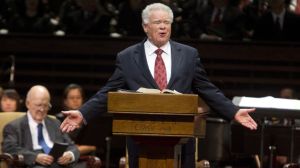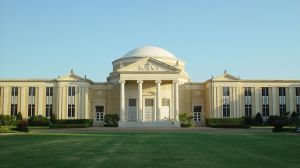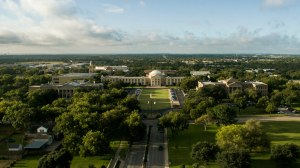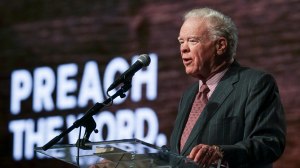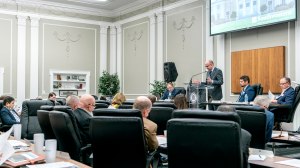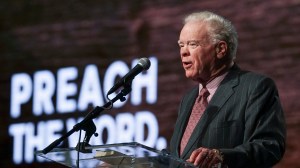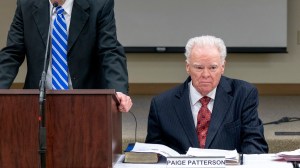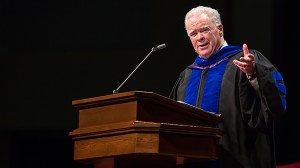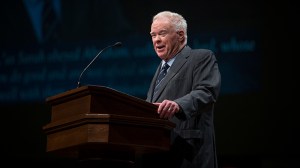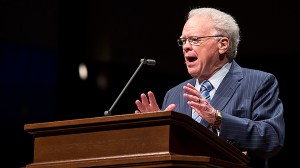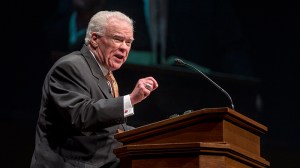In this series
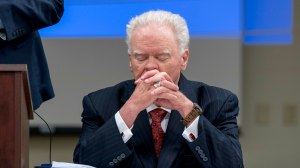
Southwestern Baptist Theological Seminary’s response to a lawsuit alleging the school failed to protect a female student against sexual assault has spotlighted ongoing tension between the seminary and its former president, Paige Patterson, who also is named as a defendant in the case.
In addition to leading Southwestern for 15 years until trustees fired him last year, Patterson, 76, was among the leaders of the Southern Baptist Convention’s Conservative Resurgence, a grassroots effort in the late 20th century to return America’s largest Protestant denomination to its theologically conservative roots.
Southwestern’s attempts to distance itself from its once-celebrated president come as a generation of younger Southern Baptists grapple with the legacy left by their predecessors. They want to honor the Resurgence, said Baptist historian Barry Hankins, but still distance themselves from negative revelations surrounding its leaders.
“We’re seeing a generational transition in the Southern Baptist Convention from an old way of doing things,” Hankins, professor of history at Baylor University, said in an interview with Christianity Today.
Southwestern trustees terminated Patterson in May 2018, citing, among other factors, his “handling of an allegation of sexual abuse against a student during” his “presidency of another institution.” The Washington Post reported Patterson had told a student at Southeastern Baptist Theological Seminary, which he led from 1992 to 2003, not to report an alleged rape to the police.
Lawsuit and response
The lawsuit against Southwestern, filed in federal court last May, alleges that pseudonymous plaintiff “Jane Roe,” a former Southwestern student, was raped at gunpoint by a fellow student and campus employee at least three times during the 2014–15 academic year.
Roe claimed both Southwestern and Patterson engaged in “negligence,” “public disclosure of private facts,” and “intentional infliction of emotional distress” related to the assaults. She accused Patterson of prodding her for “lurid and graphic details” of the rapes and stated he “interfered with a law enforcement investigation into [her] complaint.”
Southwestern responded last week, claiming Patterson “was not in the course and scope of any alleged employment” at the seminary when he supposedly committed the acts at issue. The seminary also “denies that it ratified any” of Patterson’s alleged wrongdoing. He had been the president of the school for a decade at the time of the incident.
In the 32-page filing with a US district court in Sherman, Texas, Southwestern also denied allegations the seminary committed wrongdoing and asserted a lack of “knowledge or information sufficient to form a belief as to the truth or falsity” of many specifics in Roe’s recounting of events, including claims that Patterson was among the most powerful figures in the SBC and the leader of the Conservative Resurgence.
Patterson has yet to file his response to the lawsuit and said he “cannot comment on matters of present litigation.” He has “never failed to call authorities in a case of accusation of rape,” he said, and has no regrets about his handling of sexual assault allegations at either SBC seminary he has led.
The former president expressed concern over Southwestern’s conduct since his departure, questioning the seminary’s handling of archival documents, its “removal” of faculty, and its decision to take down stained glass windows commemorating the Conservative Resurgence.
Patterson also said he has “no idea why” he was terminated. He cited some Baptists’ “suspicions that other ideological factors, such as Reformed theology and the social justice movement, were involved” but said he is unwilling to speculate on the reason for his termination.
His departure in May 2018 came after weeks of controversy surrounding the longtime Southern Baptist leader. Clips of controversial remarks Patterson made regarding women and allegations of mishandling abuse cases spread online in the wake of ongoing #MeToo conversations, culminating in a series of meetings where Southwestern trustees were forced to consider Patterson’s future at the seminary.
Southwestern declined to comment for this report.
Southwestern’s new president, Adam Greenway, has “recalibrated” the seminary going into this school year, including making staffing changes. Greenway told trustees in April the 2019–20 budget “does involve some tough choices” to “move us forward.” Internet reports of some Southwestern professors leaving the seminary have been accompanied by reports of new faculty additions, including several from Southern Baptist Theological Seminary, where Greenway served formerly as a dean.
Patterson took issue with the changes in comments provided to The Wall Street Journal, which he also shared with CT. “The abrupt removal of highly-competent [faculty] members because of their relationships to me was very painful,” he said. “While these terminations were attributed to financial crises, faculty from another institution were immediately hired.”
Southwestern also removed from its chapel more than 40 stained glass windows commemorating the Conservative Resurgence—including one depicting Patterson and his wife, Dorothy. Patterson called it an “unthinkable” treatment of “all that Baptist history,” but said that he “cannot object to the removal of” the images of himself and his wife.
The seminary stated in an April letter to donors, “It is in the best interest of the institution to remove and relocate the stained-glass windows.”
Still, when Greenway presented Southwestern’s report to the SBC annual meeting June 12 in Birmingham, Alabama, he commended the “courageous” Southern Baptists who launched the Resurgence 40 years ago and noted the work of two Southwestern professors in advancing the convention’s conservative shift.
The Patterson legacy
Hankins—author of Uneasy in Babylon, an analysis of the Conservative Resurgence—said today’s SBC leaders are grappling with the legacies of both Patterson and fellow Resurgence architect Paul Pressler in light of #MeToo-era controversies.
A 2017 lawsuit accused Pressler of sexually abusing a man for decades, beginning when the alleged victim was a 14-year-old boy. Pressler denied the allegations, and the portion of the suit alleging sexual abuse was dismissed because the statute of limitations had expired.
Controversies surrounding specific individuals don’t “delegitimize” the entire Southern Baptist conservative movement, Hankins said. Some Resurgence leaders, however, may have “gotten used to only talking to themselves and their base, just like we see in politics. So they end up never developing the ability to understand how the things they say can sound outside of their own echo chamber.”
Last year, thousands who self-identified as “concerned Southern Baptist women who affirm the Baptist Faith and Message 2000” signed a letter claiming statements Patterson made about domestic violence and a teenage girl’s physical appearance were “unbefitting” a leader. A similar letter from concerned Southern Baptist men followed.
Patterson apologized around the same time “to every woman who has been wounded by anything I have said that was inappropriate or that lacked clarity.”
Insensitivity around gender issues may stem from a misapplication of complementarianism, the belief men and women are of equal value but created for different roles in the church and home, Hankins said. Southern Baptist conservatives have claimed misogyny and abuse represent a repudiation of complementarianism, not merely a misapplication.
Among current SBC leaders Hankins cited as attempting to correct the insensitivity of a past generation are Southern Seminary President Albert Mohler, Ethics and Religious Liberty Commission President Russell Moore, and SBC President J. D. Greear.
The week before Southwestern terminated Patterson (but after trustees had moved him to president emeritus status) Greear said in a statement, “Dr. Patterson was very influential in my early ministry, which has made this whole situation heartbreaking for me.” But “there can be no ambiguity about the church's responsibility to protect the abused and to be a safe place for the vulnerable. Abuse can never be tolerated, minimized, hidden, or ‘handled internally.’”
Over the past year, the SBC has turned more attention and resources toward its response to abuse, a major emphasis at this year’s SBC annual meeting in June. After newspaper investigations exposed hundreds of cases of sexual abuse in the denomination, the SBC adopted a resolution “on the evil of sexual abuse” and amendments of the convention’s governing documents to strengthen its stance against abuse.
Dorothy Patterson attended the Birmingham SBC because her brother Chuck Kelley was being honored upon his retirement as president of New Orleans Baptist Theological Seminary, Patterson’s office said. Paige Patterson did not attend.
Amid efforts by some Southern Baptists to distance themselves from Patterson, the Conservative Resurgence remains popular within the SBC, with articles in Baptist Press and state Baptist newspapers commemorating the movement’s 40th anniversary .
Support for Patterson remains in the convention as well. He preaches at Southern Baptist churches, has a building named in his honor at Southeastern Seminary (though reports have claimed his portrait has been removed from it), and receives regular endorsements from Southern Baptists on social media.
In time, Hankins said, Patterson likely “will be remembered primarily for his leadership of Southern Baptists’ conservative movement,” and the controversy at the end of his career will be relegated to an “asterisk” in historical accounts.
Patterson has until August 26 to file his response to the lawsuit, according to court documents.
David Roach is a writer in Nashville, Tennessee.


